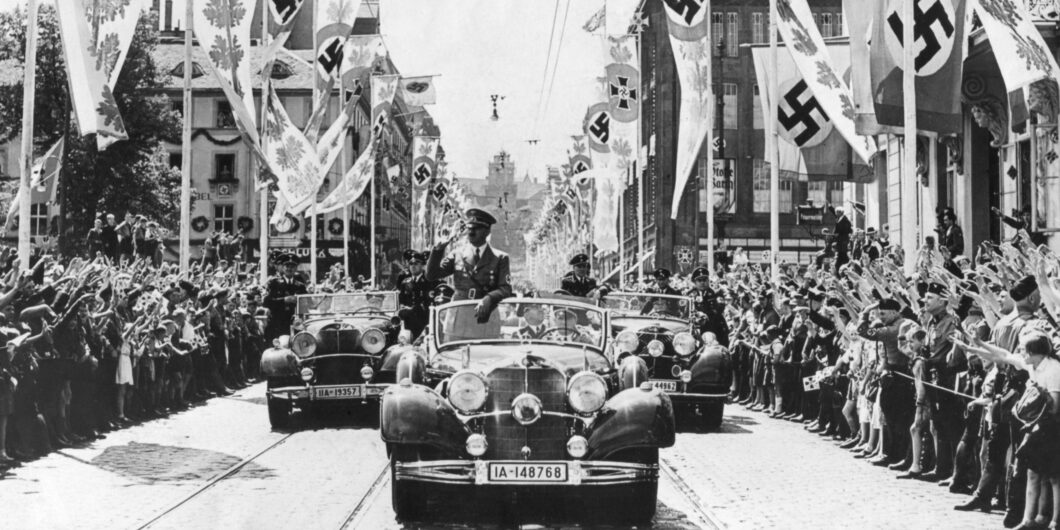From bitter experience the Social-Democrats know that life in Mrs. Merkel’s political embrace is a kiss of the spider woman: you slowly die.
The Chilling Logic of Gleichschaltung
In the early 1800s, when Frenchman Alexis de Tocqueville traveled the United States, he made an astute observation about how this country worked. In America, civil society matters. So does its byproduct, culture. As Tocqueville recorded:
Americans of all ages, conditions and all dispositions constantly unite together. … To hold fetes, found seminaries, build inns, construct churches, distribute books, dispatch missionaries to the antipodes. They establish hospitals, prisons, schools by the same method. Finally, if they wish to highlight a truth or develop an opinion by the encouragement of a great example, they form an association.
While election outcomes choose leaders and political power determines laws, Tocqueville noted that the indispensable mortar that secures the political bricks is civil society. And what exactly is civil society? Any group, outside of the government, that gathers together in the name of a common interest. Civil society ranges from the American Medical Association to the Girl Scouts, the Minnesota Curling Club to the Independent Order of Odd Fellows, the League of Women Voters to the Entomology Society of America, the American Association of Retired Persons to the Sierra Club. Religious faithful and interest groups, volunteers and enthusiasts all gather to promote morals or hobbies, sports or civic responsibilities. Have an interest? Hold a passion? Believe in a cause? Join a club, start a movement, enter an organization. You are now a part of civil society.
Whimsically reflecting on Tocqueville’s epiphany, Senator Ben Sasse wrote:
When Tocqueville arrives in Washington, he finds a swamp. He realizes he must go elsewhere to find the source of American innovation. He spends nine months traveling up and down the United States. Finally, he writes back to Europe and says, “I found the meaning of America. It is … the Rotary Club.”
To be sure, Tocqueville discovered our magic—civil society shapes and sustains culture. But other malevolent figures have discovered this too.
When Adolf Hitler assumed power as Chancellor of Germany in 1933, he knew that his work was only beginning. There is only so much control one possesses through political and legal channels. What a leader needs is the support (or control) of civil society. Totalitarian aims demand a totalistic approach to society. That is why the Nazis began their campaign of cultural power long before they achieved political power. But how did they do it? In the early 1920s, under Hitler’s nascent leadership, the Nazi Party sought to be more than just a political party. They fashioned themselves as a civic group and Völkisch religion rooted in blood and soil.
National Socialism capitalized on people’s base appetites (for power, wealth, honor, and revenge) and crafted a particular narrative: The German nation was a proud nation with a special culture rooted in blood and soil. German defeats were at the hands of villainous traitors like the Jews and the Communists.
The Nazis gathered people with similar backgrounds, interests, and aspirations. In beer halls, they drank and yelled, discussed and debated, fought and threatened. They identified their creed and named their enemies. And, after a raucous night, each participant went back to their homes and jobs and talked about what they heard, learned, and experienced. Under the right economic and cultural circumstances in the late 1920s/early 1930s, a groundswell began. Budding enthusiasts for the Nazi movement wanted more, and Hitler was willing to give it to them.
Before long, Nazi newspapers and pamphlets were churned out and passed around, rowdy parades and protests were organized, and bloody fights broke out between rival movements such as the Communists and Socialists. Interested in forever growing their movement and message, Nazis brought their ideas to their churches and unions, professional associations and sporting clubs. How did they do this? National Socialism capitalized on people’s base appetites (for power, wealth, honor, and revenge) and crafted a particular narrative: The German nation was a proud nation with a special culture rooted in blood and soil. German defeats were at the hands of villainous traitors like the Jews and the Communists. There needs to be a reckoning. While many rolled their eyes and shook their heads, others took a second look. The seed was being planted. Culture was being transformed.
In the wake of the Black Friday stock market crash in 1929, American loans to Germany dried up, casting the German nation into economic turmoil. This domestic catastrophe granted the greatest fortune to radical movements. In election after election between 1930 and 1932, the Nazi party rose phoenix-like from the ashes of its mid-1920s failures. On January 30, 1933, the unimaginable happened: Adolf Hitler was named Chancellor of Germany. Joseph Goebbels, Hitler’s starry-eyed Minister of Propaganda, wept, “It’s like a dream. The Wilhelmßtrasse is ours.”
Notwithstanding this inexplicable turn of events, Nazi political domination was not yet complete. But in short order—not even a month into Hitler’s Chancellorship—the Reichstag fire (purportedly lit by a lone wolf anti-Nazi Communist) served as a pretext for the Nazi consolidation of power. In an overwhelming vote of 444-94, the Reichstag’s Enabling Act granted Hitler almost unfettered power to deal with enemies of the state and the economic crisis.
The ease with which <i>Gleichshaltung</i> unfolded is troubling. Clearly, Nazi power could be oppressive but, even more, there was an element of cultural assent.
Prior to Hitler’s accession to power, in innumerable German locales, the Nazis had erected a political shadow government with administrative regions dubbed Gaues and local leaders named Gauleiters. When Hitler achieved power, wherever possible, he simply disempowered those legally elected in state races, and “activated” his “own man.” Gauleiters would become Reich Governors. Difficulties arose, however, when certain Gauleiters were suspect figures in their local society (think how Austrian Captain von Trapp felt about Gauleiter Hans Zeller in The Sound of Music). This further reinforced that civil society and its incontestable cultural influence were where true power was to be found. And the Nazis would seize it.
Civil society would come under Nazi control through the policy of Gleichschaltung. Gleichschaltung is a German term meaning “coordination” or “bringing into line.” Another name for it is “Nazification.” And, in many respects, it was as easy as “flipping a switch.” With only seven laws passed (in twenty sessions) by the Reichstag (which further eliminated barriers to Hitler’s control) and 986 laws enacted unilaterally by Hitler’s government, this cultural consolidation proved to be surprisingly easy.
In the eyes of Hitler and his minions, Tocqueville’s mortar of culture—civil society—needed to be Nazified. And so it was. Down to the smallest corners of German villages, the Party wanted coordination. Very soon, veteran’s associations, shooting clubs, garden associations, and singing associations all bore the Nazi stamp. “There was no more social life,” growled a German from Lower Saxony, “you couldn’t even have a bowling club [that was not] coordinated.” Boys and girls clubs were swallowed up by the Hitler Youth and the League of German Maidens. Employment proved difficult for those physicians, lawyers, and teachers not in good standing with their respective Nazified professional societies. In time, even many churches were Nazified with paeans to the Führer offered in a dark liturgical space bedecked with a swastika flag, Mein Kampf, and a sword on the altar.
The ease with which Gleichshaltung unfolded is troubling. Clearly, Nazi power could be oppressive but, even more, there was an element of cultural assent. In just sixty years, Germany had united from scattershot multiethnic fiefdoms to a robust economic and military powerhouse under Bismarck, then Kaiser Wilhelm II, and now Hitler. Germany was demoralized by defeat in the Great War, suspicious of “alien influences” rising to power under an imposed Weimar Republic, and economically strangled by reparations and a sinking world economy. Hitler, the strongman with radical ideas, offered a near Messianic deliverance, if not retribution. In the eyes of many, the Nazi vision was the first breath of homegrown national revival in nearly two decades, and they wanted to be a part of it.
The levers of influence, as Hitler biographer Sir Ian Kershaw wrote, including “the press, radio, film production, theatre, music, the visual arts, literature and all other forms of cultural activity were reorganized in line with Hitler’s promise in March [1933].” Joseph Goebbels began his role as Reich Propaganda Minister with a speech insisting that these efforts strive “to work on people until they have capitulated to us,” “to unite the nation behind the ideal of the national revolution,” and to bring about the complete “mobilization of the Spirit.” Surely, Hitler would agree with Mussolini’s spoken totalitarian designs, “Everything in the State, nothing outside the state, nothing against the state.” Again, political power is one thing, Hitler and Tocqueville would agree. But cultural power is quite another.
So what happens when an ideological movement gains political power, but seeks, insidiously or overtly, to “coordinate” the culture? Unless it is identified and resisted (through a politically engaged populace, a defense of first freedoms including religion, speech, press, and assembly, and an assertion that civil society should maintain a healthy independence from political powers), the culture is changed by force or by acquiescence. Drop by drop, deformation occurs. A sort of willful amnesia blankets society. And then you no longer know who you are, because you no longer are who you were. A culturally deformed Germany would descend into an orgy of violence. A culturally deformed America would wallow in malaise and decadence, but shows recent birth pangs of violent and ideological tendencies.
Tocqueville would shudder at what Hitler and the Nazis wrought. And I imagine he would be dismayed by a wayward America. But Tocqueville would not be surprised. He foretold it.
After having thus successively taken each member of the community in its powerful grasp, and fashioned them at will, the supreme power then extends its arm over the whole community. It covers the surface of society with a net-work of small complicated rules, minute and uniform, through which the most original minds and the most energetic characters cannot penetrate, to rise above the crowd. The will of man is not shattered, but softened, bent, and guided: men are seldom forced by it to act, but they are constantly restrained from acting: such a power does not destroy, but it prevents existence; it does not tyrannize, but it compresses, enervates, extinguishes, and stupefies a people, till each nation is reduced to be nothing better than a flock of timid and industrious animals, of which the government is the shepherd.
What are the costs to societies that become ideologically coordinated and culturally deformed? What is the fate of Gleichschaltung? In a chilling speech in late 1933, Hitler tells us,
When an opponent says, “I will not come over to your side,” I calmly say, “Your child belongs to us already … you will pass on. Your descendants, however, now stand in the new camp. In a short time they will know nothing else but this new community.”
Two hundred years ago, Alexis de Tocqueville comprehended the incontestable value of civil society in shaping culture and destiny. One hundred years ago, for darker motives, Adolf Hitler understood as well.
Do we?


